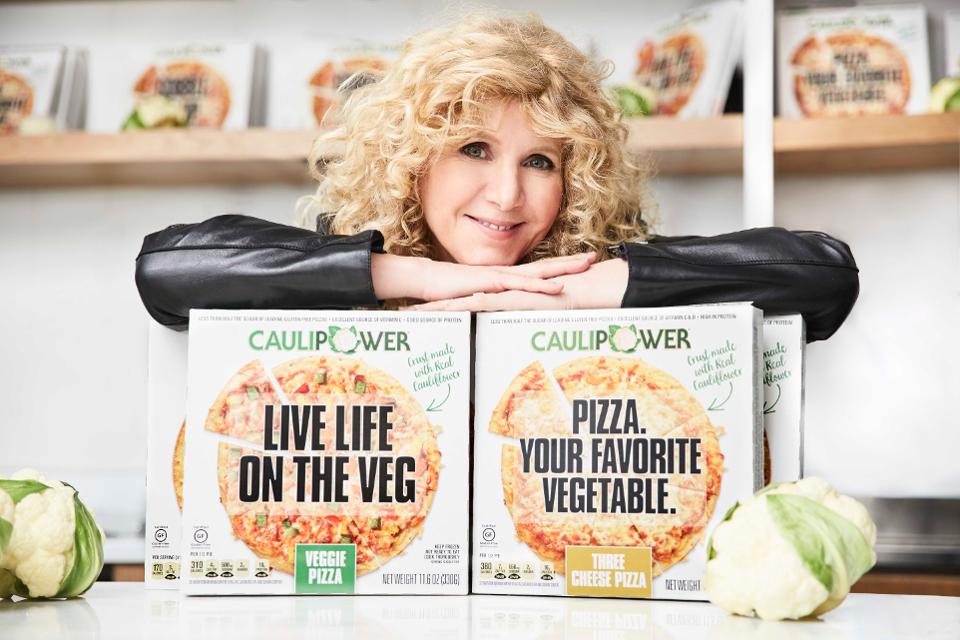
The Female Founder Behind The Better-For-You Comfort Food Revolution
The disruption of frozen pizza couldn’t have come at a more opportune time. As much of the country shelters in place, comfort foods are making a raging comeback. But, paradoxically, better-for-you foods are selling well, too, with organic produce sales jumping 22% in March. One barely three-year-old brand is forging a path to connect three traditionally competing attributes: taste, nutrition and convenience. Thanks to newbie food brand CAULIPOWER, better-for-you comfort food is an oxymoron no more.
Gail Becker came up with the idea for CAULIPOWER in 2016. At the time, she was a senior executive at famed global PR consultancy Edelman. Before that, she was a global VP at Warner Brothers, a staffer for the US Department of Health & Human Services and a member of the national press staff during the 1992 presidential campaign. From a professional perspective, she had achieved it all. But when Becker’s father passed away, she found herself seeking more meaning and greater social impact from her career. After a failed attempt to create a tasty cauliflower-crust pizza for her two boys, both of whom have celiac disease and cannot eat gluten, Becker came up with the idea for CAULIPOWER.
After spending months perfecting the product and business strategy, Becker launched CAULIPOWER in thirty Whole Foods stores with four SKUs in February, 2017. In that first year, the company generated $5 million in sales. The next year, they were up to $45 million. And by year three: $100 million. In fact, CAULIPOWER is now the 5th fastest growing food brand among companies generating above $100 million in annual revenue, according to SPINS industry data.
Today, and 25,000 stores later, CAULIPOWER is among the top 10 frozen pizza brands in America and the best-selling frozen pizza brand on Amazon. It is also #1 in sales among better-for-you and gluten-free frozen pizza offerings. Cauliflower crust pizza, a category the company pioneered, now accounts for 3 percent of the $5.7 billion US frozen pizza market, according to SPINS industry data. “We’ve brought people back to pizza,” Becker explains. “Twenty-five percent of the people who buy our products haven’t bought frozen pizza in the past year. The reasoning is simple: we’re as much about taste and nutrition as we are about convenience. We’re devoted to making people’s lives easier and better.”
The company is doing more than making their consumers’ lives a little better. Today they’re announcing a $1 million donation to the American Heart Association for families struggling with food insecurity during the pandemic. This is the kind of donation typical of large, publicly traded companies, not emerging startups. “We’re making this donation to give real food to real people in real time,” said Becker. “Initially, our donation will be delivering 100,000 meals to 4500 families across four US cities.” She and her team recently handed out the first batch of boxes of produce from local farmers and were overwhelmed by the positive responses. “People were so grateful to receive beautiful baskets of fresh produce. To be in a position to help people like this is an extraordinary feeling.” Going forward, the donation will support the American Heart Association’s national Teaching Garden program by giving grants to schools across the country to educate children about the importance of healthy eating.
CAULIPOWER is in a position to engage in philanthropic endeavors in part because they predicted the consumer shift to vegetable-forward frozen food. The company has a multi-channel strategy, selling through 25,000 retailers, online grocers and directly to consumers. “We estimate that around 15 percent of our sales—and growing—are through online channels like Walmart.com and Kroger online. We’re good at growing fast, so we were well-prepared for the shift in consumer behavior and were able to scale to meet increased demand,” said Becker. “We were ready. In fact, our sales over the past two months were double what they were during the same period last year.”
“The innovation never stops at CAULIPOWER,” said Becker, who went on to describe the products they’ve launched beyond their original four pizza SKUs, such as cauliflower-based tortillas, Sweet PotaTOASTs, and their newly launched chicken tenders. “Our chicken tenders are off to a roaring start. We only launched them in September, but we’ve already claimed 1-2% of the market.” The company had planned to launch microwaveable, clean-label flavored riced cauliflower in March, but due to the pandemic, they’re only just rolling into stores. “Already 15% of our sales are non-pizza, and 35% of our sales extend beyond our original four pizza SKUs. We have plans for new products in the coming months and years, all rooted in our ability to hear what consumers want. Consumers keep inviting us to expand into new product categories and to continue to innovate, so that’s exactly what we’re doing.”
CAULIPOWER employs 50 people, 10 of whom had jobs that were rendered inactive by the shift in buying practices during the pandemic. Instead of laying off those workers, Becker trained them in new skills and is continuing to hire additional new employees. “Everyone here shares our passion to bring better-for-you foods in a convenient and easy way to people across America. What a privilege to be able to hire people right now and make sure that people’s jobs are secure. You could say that business has never been busier, but the reality is that we’ve always been busy. We disrupted a sleepy category that had not seen innovation in a long time. No one saw us coming.” CAULIPOWER may have been under-the-radar a year or two ago, but now that the fledgling upstart has disrupted the long-stagnant freezer aisle, they are a secret no more.
Photo Source: Gail Becker, CAULIPOWER







